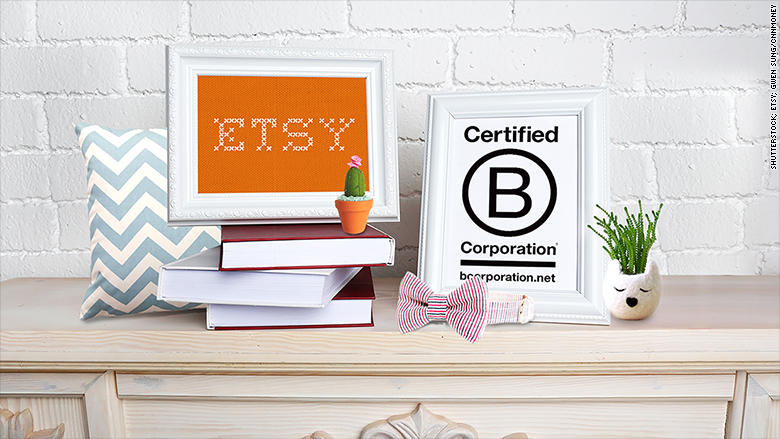
Can a do-good company jive with Wall Street?
Etsy, which filed to become a public company this month, is a certified socially-responsible company, also known as a B Corporation. And it's the largest one to go public in the United States.
But there's a part of Etsy's ethos that most don't talk about: its commitment to helping struggling cities foster local entrepreneurs.
The Craft Entrepreneurship effort began with a tweet. In August 2012, Rockford, Ill., Mayor Larry Morrissey reached out to Etsy CEO Chad Dickerson: "Since we need an 'Etsy Economy' has Etsy begun any partnerships with high schools or job training? We'd love to explore."
Rockford, whose economy was once built on manufacturing, has been riddled with poverty and crime, said Morrissey. The city has "really struggled as a community to find a way amid the recession." He said he "saw seeds of opportunities" in the growing Maker Movement.
Dickerson responded to Morrissey's plea, and in 2013, Etsy launched its first Craft Entrepreneurship programs in Rockford and New York City.
The programs are very much designed to fit each city and its needs. In Rockford, the program was launched in collaboration with the Rockford Housing Authority -- a public housing organization. It was an ambitious move considering most who lived there didn't have bank accounts -- and many weren't computer literate.
The Etsy-designed curriculum consisted of 14 hours of training over four weeks and included everything from marketing to search engine optimization. (Participants were required to have some sort of craft skill.)
So far, the Housing Authority has run just one program, graduating nine people, according to Rockford Housing Authority's CEO and director Ron Clewer.
He said the next Craft Entrepreneurship program will launch this spring -- eight students are already enrolled.
So far, it's too soon to tell the impact of the Etsy Economy on Rockford.
"There are no success stories that we can point to [that show] this person got out of a poverty using Etsy," said Pablo Korona, a videographer who documented the pilot program. "Over time, we'll see what happens."
But the city has been taking steps to boost entrepreneurship even outside of Etsy. The Housing Authority has been running an eight-week course on business basics for the past two years. And Rockford recently introduced a version of the Craft Entrepreneurship for high school students.
The efforts are starting to pay off.
According to Amy Michalek, who co-runs a local Etsy meetup, there were just 75 Etsy community members in 2011. Today, there are as many as 190 members, she said.
With such a committed community, many fear Etsy will sell out when it goes public.
In the SEC filing, Dickerson tried to dispel that concern. He cited the Craft Entrepreneurship program as "an inspirational model for even deeper community involvement in the coming years" and noted the effort to expand the program even further (it's now in 10 cities, including St. Petersburg, Fla., and Watsonville, Calif.).
And in fact, Etsy has improved its "do good" standing since it applied for B Corps certification, according to Andrew Kassoy, cofounder of B Lab, the nonprofit that certifies B Corps.
When Etsy filed for its B Corporation certification in 2012, it "barely" passed, Kassoy said. He added that the certification might actually help Etsy maintain its mission when going public, since it allows companies to pursue social goals instead of purely financial ones, mitigating potential shareholder lawsuits.
"Companies in the public market are under intense scrutiny and pressure to create quarterly profits and as a result are pressured to think in a short-term way," said Kassoy. "[B Corps certification] gives companies the protection to actually create that value in the long term [and] send that signal to investors."



